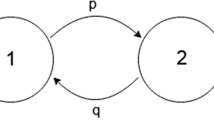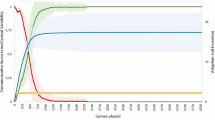Abstract
As it was shown in related papers, a conditional tabled eco-grammar system represents itself a rich multi-agent formal framework, allowing among other things to characterize some important classes of formal languages. Some new results about generative power of extended conditional tabled eco-grammar (ECTEG) systems are shown. In order to extend the previous research the main interest is devoted to so far less studied systems with scattered mode context conditions. It is proven that several hierarchies of these language classes collapse and that the ECTEG 1(1,2;s) class characterizes context-sensitive languages.
Similar content being viewed by others
References
Csuhaj-Varjú, E., Gh., Păun and A. Salomaa. Conditional tabled eco-grammar systems. In Gh. Păun, editor,Artificial Life: Grammatical Models, 227–239, The Black Sea University Press, Bucharest, 1995.
Csuhaj-Varjú, E., J. Kelemen, A. Kelemenová and Gh. Păun. Eco-grammar systems. A preview. In R. Trappl, editor, Proc. 12th European Meeting on Cybernetics and System Research, 941–948, World Scientific, Singapore, 1994.
Csuhaj-Varjú, E., J. Kelemen, A. Kelemenová and Gh. Păun. Eco-grammar systems - a grammatical framework for life-like interactions. Artificial Life, 3: 1–28, 1997.
Csuhaj-Varjú, E. and Gh. Păun and A. Salomaa. Conditional tabled eco-grammar systems versus (E)T0L systems. Journal of Universal Computer Science, 1: 5, 1995.
Dassow, J. and V. Mihalache. Eco-grammar systems, matrix grammars and E0L systems. In Gh. Păun, editor, Artificial Life: Grammatical Models, 210–226, The Black Sea University Press, Bucharest, 1995.
Dassow J. and Gh. Păun. Regulated Rewriting in Formal Language Theory. Springer-Verlag, Berlin, Heidelberg, 1989.
Kelemenová, A. and J. Kelemen. From colonies to (eco)grammar systems - an overview. In J. Karhumaki, H. Maurer and G. Rozenberg, editors, Results and Trends in Theoretical Computer Science, 213–231, Springer-Verlag, Berlin 1994.
Mihalache, V. Extended conditional-tabled eco-grammar systems. Journal of Information Processing and Cybernetics, 30: 213–229, 1994.
Păun, Gh, editor. Artificial Life: Grammatical Models. The Black Sea University Press, Bucharest, 1995.
Salomaa, A. Formal Languages, Academic Press, New York, 1973.
Salomaa, A. and G. Rozenberg, editors. Handbook of Formal Languages. Springer-Verlag, Berlin, 1997.
Sosík, P. On the hierarchy of extended conditional tabled eco-grammar systems. Grammars 1(3): 225–238, 1998.
Author information
Authors and Affiliations
Rights and permissions
About this article
Cite this article
Sosík, P. Conditional Tabled Eco-Grammar Systems: the Scattered Contexts. Grammars 2, 235–245 (1999). https://doi.org/10.1023/A:1009958300711
Issue Date:
DOI: https://doi.org/10.1023/A:1009958300711




